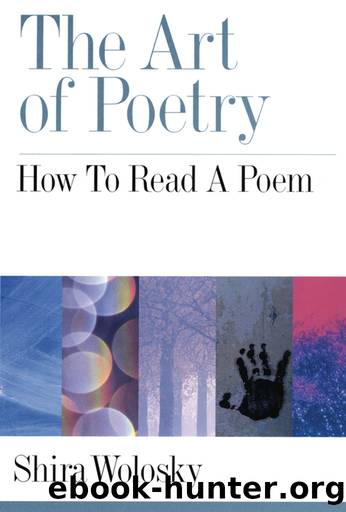The Art of Poetry by Wolosky Shira;

Author:Wolosky, Shira;
Language: eng
Format: epub
Publisher: Oxford University Press USA - OSO
Published: 2001-02-15T00:00:00+00:00
Gender and Poetic Voice â10
The question of poetic voice offers a special invitation to consider gender and its poetic roles: in what ways do women speak, in poetry, as women? To what extent do they project a feminine viewpoint? But gender may potentially affect almost every element of poetry. Are there particular kinds of imagery that women, or men, might introduce? Is a male stance implicit in (some) traditional verse forms? Would a woman writing in these forms then alter them? If poetic conventions make up a literary tradition, what access do women have to it? Is there a womenâs tradition of poetry? Are there specific figures, or self-representations, especially associated with women (or with men)? May there even be some sort of gendering embedded in language, in its grammatical orders or usages or constructions?
The very posing of these questions reflects a shift in critical consciousness and discussion. They are relatively new, and are part of an effort to recover and assess the writings of women that have been traditionally pushed to the side, if not altogether omitted, from literary history. Answering them requires investigating the history of literary production and reception; of education; and of gender roles in political, social, and literary spheres. Womenâs access to an education that could serve as the foundation for literary creativity remained limited up until the nineteenth century. This lack of education obviously constrained womenâs writing. Poetry presumes, first, literacy, but also a command of the conventions and forms out of which new literature can be created.
The procedures of preservation and transmission also worked against any sense of a womenâs literary tradition. When women did write poems, they were not incorporated into a curriculum or corpus of works that was passed down. Each woman writer therefore often found herself inventing anew not only her materials, but even more, her role as poet. This question of poetic role is crucial and far-reaching. Claiming the mantle of poetic authority, of self-confident creativity, and of command of an audience, is deeply problematic within the history of feminine roles in culture and society.
The course of womenâs writing through history has therefore been highly discontinuous. Rather than building on earlier efforts and examples, each woman poet has had, until recently, to make a new beginning. Just this recognition of a history lost and needing to be recovered is a concern only of twentieth-century womenâs poetry, as is the sense of writing in the name of a womanâs tradition that can build on prior works. In twentieth-century writings, the questions of gender in poetry have become increasingly self-conscious and have entered into the composition of the poems themselves. Such self-conscious reflection on issues such as the role of a female poet, or the way a female poet may assume and perhaps redefine the poetâs role; on female experience, as registered in point of view, or imagery, or formal expression, or even language; has become the very material for poetry. These topics, and this self-consciousness concerning them, in themselves mark a gendered element in poetic creation.
Download
This site does not store any files on its server. We only index and link to content provided by other sites. Please contact the content providers to delete copyright contents if any and email us, we'll remove relevant links or contents immediately.
| Ancient, Classical & Medieval | Anthologies |
| British & Irish | Japanese & Haiku |
| Love Poems | Regional & Cultural |
| Themes & Styles | United States |
| Women Authors |
The Universe of Us by Lang Leav(14364)
The Sun and Her Flowers by Rupi Kaur(13691)
Adultolescence by Gabbie Hanna(8142)
Whiskey Words & a Shovel II by r.h. Sin(7478)
Love Her Wild by Atticus(7229)
Smoke & Mirrors by Michael Faudet(5508)
Wiseguy by Nicholas Pileggi(4585)
The Princess Saves Herself in This One by Amanda Lovelace(4509)
Love & Misadventure by Lang Leav(4354)
Milk and Honey by Rupi Kaur(4226)
Memories by Lang Leav(4170)
Good morning to Goodnight by Eleni Kaur(3805)
Bluets by Maggie Nelson(3707)
Too Much and Not the Mood by Durga Chew-Bose(3693)
Algedonic by r.h. Sin(3499)
Pillow Thoughts by Courtney Peppernell(3393)
The Poetry of Pablo Neruda by Pablo Neruda(3364)
HER II by Pierre Alex Jeanty(3169)
Stuff I've Been Feeling Lately by Alicia Cook(3053)
